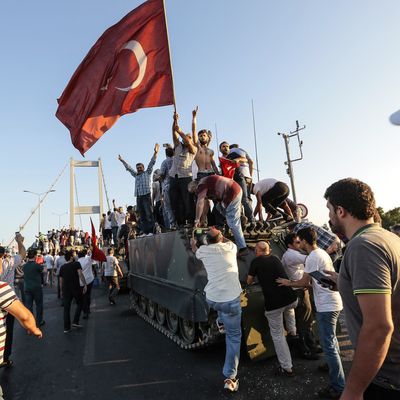
At least 265 people are dead and 1,440 injured after a failed military coup in Turkey on Friday night, which for a time turned Istanbul and Ankara into active war zones. The New York Times reports that the Turkish government has already arrested thousands of military personnel who are believed to have been involved in the attempt. Turkish president Recep Tayyip Erdogan — who, at one point Friday night, called on Turkish citizens to take to the streets to oppose the coup — says his government is now in full control of the country, and prime minister Binali Yildirim declared Saturday afternoon that the uprising was over, calling it a “a stain in the history of democracy.” Erdogan, who was on vacation when the attempt started, returned to Istanbul early Saturday morning, and he has vowed that those who participated in the attempted coup will pay a “heavy price.” Some may already have: There have been reports of reprisal killings against coup supporters on Saturday. While capital punishment is banned in Turkey, Prime Minister Yildirim has already proposed changing the law to allow executions for the coup-plotters.
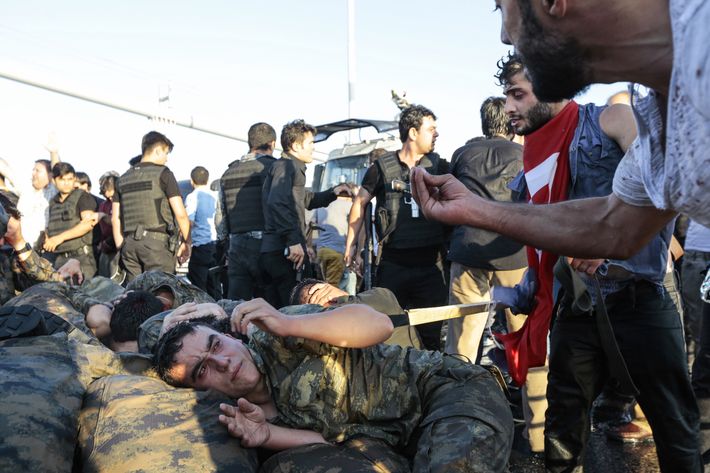
Regardless, the attempt — which involved pitched military battles in the country’s two largest cities, both on the ground and in the sky — remains a massive political crisis and is the most significant threat to the country’s stability in decades. It follows a long period of turmoil during which the country has suffered regular, large-scale terrorist attacks; been besieged by Syrian refugees; and fought a renewed conflict with Kurdish militants — all while the leader of its government works to assert more and more authoritarian control.
The attempt has also unsettled many in the international community, as Turkey is not only a major power in the Middle East, but a member of NATO and a key Western ally in the fight against ISIS in neighboring Syria and Iraq. While the attempt was underway, world leaders joined Turkish political parties and officials — including those who oppose Erdogan — in denouncing the coup and expressing their support for the country’s democratically elected government. While the far-from-bloodless coup appears to have been poorly planned and executed, and while a widespread crackdown on both the plotters and perceived opponents of the government is already underway, it is not yet clear what short- or long-term impacts the event will have on the country.
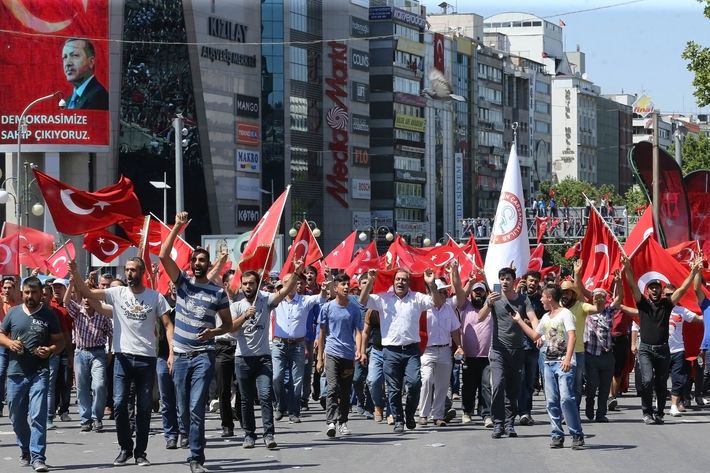
The Associated Press reports that the coup was backed by many within the most senior ranks of the Turkish military, though not by the entire military leadership. The military has traditionally been at odds with Erdogan’s ruling AKP party, which has regularly sought to reduce the military’s power in the country. There is also a long history of military coups in Turkey: Three successful coups occurred between 1960 and 1980, and in 1997, the military pressured Prime Minister Necmettin Erbakan, a mentor of Erdogan’s, out of power.
Prime Minister Yildirim announced on Saturday that 161 of those killed were either those opposing the coup or civilians caught in the crossfire, meaning the remaining dead must have been considered coup-supporters. It seems that police and soldiers loyal to the government, as well as ordinary civilians and AKP supporters who heeded the call of Erdogan and local mosques to take to the streets, banded together to repel the coup. At this point, it seems as though coup participants at times targeted and killed civilians during the fighting, though precise details from the various confrontations remain murky.

Nearly 3,000 Turkish military personnel have been detained, and at least five generals and 29 colonels have been removed from their posts. The Washington Post reports that the generals detained include the commanders of the Second and Third Armies — the latter being the country’s largest field army, and the former being the one that controls the country’s borders. The apparent mastermind of the coup, according to Turkish authorities, was the country’s former air-force commander, General Akin Ozturk, who was also a member of the Supreme Military Council.
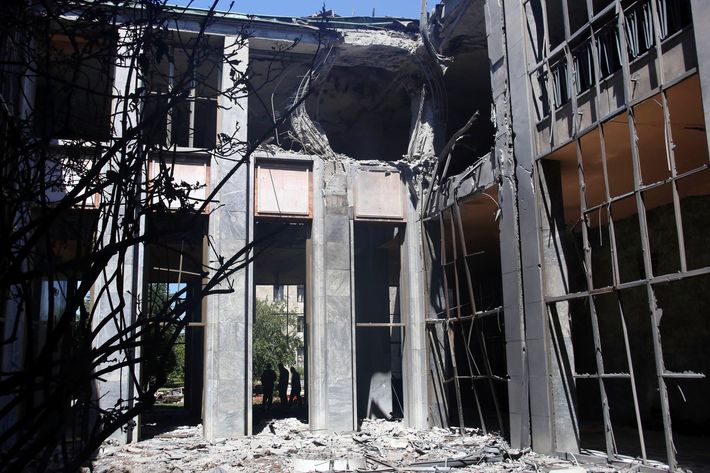
After the coup faltered, eight Turkish army personnel were able to fly a helicopter to Greece, where they requested political asylum — though Turkey is already pushing for their extradition.
The Turkish government says that some low-ranking military personnel have told investigators that they didn’t even know they were participating in a coup, and instead thought they were on military maneuvers. It is not known how much of the military’s rank and file supported the coup, or how much of the larger military establishment did. In addition, it’s important to remember that statements from the Turkish government and its large state-run-or-influenced media empire should not always be taken at face value.
In addition, the Turkish government has already purged some 2,745 judicial officials in the aftermath of the attempted coup, including ten members of the country’s highest administrative court, all for alleged ties to the coup plot — or, more specifically, to Fethullah Gülen, who the Erdogan regime has quickly blamed for the uprising. But, at this point, he does not seem likely to be the culprit. Gülen, who currently lives in exile in Pennsylvania but maintains a vast network of supporters across Turkey, rejects any blame, and publicly condemned the attempted coup on Friday. Gülen said, “As someone who suffered under multiple military coups during the past five decades, it is especially insulting to be accused of having any link to such an attempt. I categorically deny such accusations.”
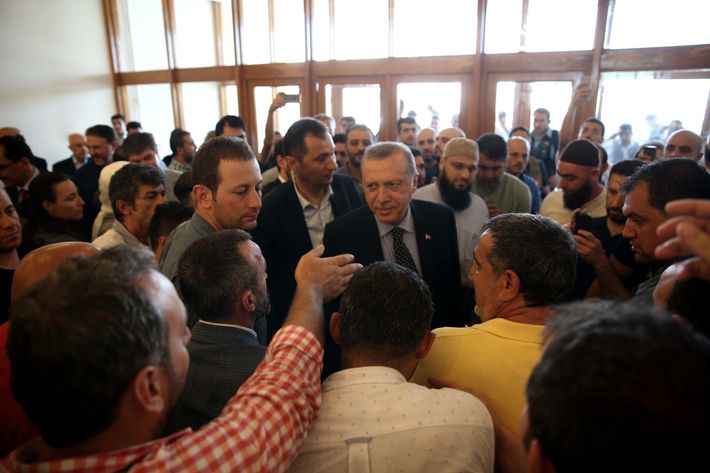
The purge of judicial officials is likely only the start of what may be a far-reaching crackdown of perceived opponents by Erdogan. Though democratically elected, he has consistently sought to consolidate power in the country, and will likely have a big opportunity to advance that goal following the failed coup.
President Obama and Secretary of State John Kerry have both condemned the coup and expressed their support for the Turkish government. The Washington Post reports that the U.S. military raised its protection levels on bases in the country to the highest level, “condition Delta,” in response to the uprising. The U.S. facilitates much of its war on ISIS from bases in Turkey, and it seems that airstrikes crucial to the fight against ISIS from Turkey are now at least temporarily halted, as Turkish airspace has been closed. The long-term impact on U.S. operations based out of Turkey is not yet clear, but the American military told the Guardian that they didn’t expect a long-term disruption. However, it stands to reason that Turkey itself will not be as active in counter-ISIS efforts anytime soon.
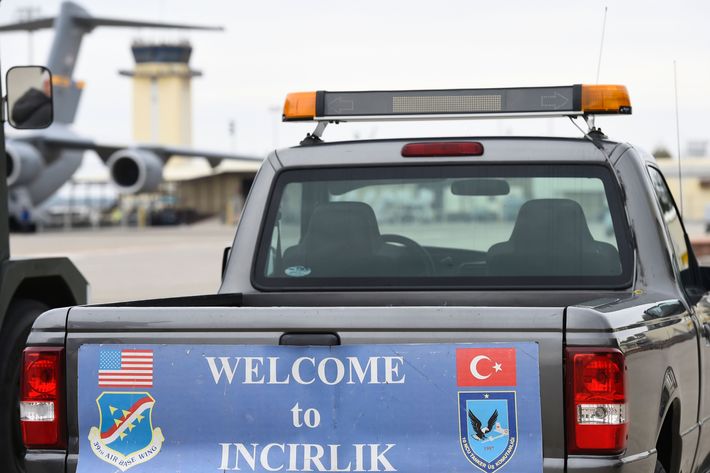
This is a developing story, and this post has been updated throughout.






























